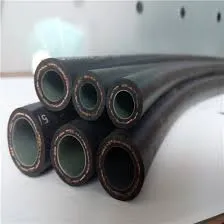Oct . 05, 2024 02:31 Back to list
resin hose product
Understanding Resin Hose Products A Comprehensive Overview
In the world of industrial applications, the versatility and performance of materials play a crucial role in determining the effectiveness of operations. Among these materials, resin hoses have emerged as a reliable choice for various industries, including automotive, pharmaceuticals, food and beverage, and many others. This article delves into the significance, applications, benefits, and future prospects of resin hose products.
What are Resin Hoses?
Resin hoses are flexible tubes made from synthetic resins. They are designed to convey fluids and gases in a variety of settings. The primary materials used for making resin hoses include polyethylene, polypropylene, and polyvinyl chloride (PVC). Each type of resin offers unique properties, making it suitable for different applications. Resins can be engineered to provide excellent chemical resistance, temperature stability, and durability, which are essential for many industrial tasks.
Common Applications
Resin hoses are widely used across multiple sectors due to their flexible nature and resistance to a wide range of substances
1. Automotive Industry In automotive applications, resin hoses are used for fuel and oil transfer, coolant circulation, and even air intake systems. Their compatibility with various fluids and ability to withstand high temperatures make them ideal for these applications.
2. Pharmaceutical and Food & Beverage In the pharmaceutical sector and food processing industries, hygiene and safety are paramount. Resin hoses that comply with stringent regulations are essential in these sectors. They prevent contamination while ensuring the safe transport of products.
3. Agriculture Whether for irrigation systems or chemical spraying, resin hoses are critical in agricultural settings. Their flexibility and durability allow for ease of use in various terrains and weather conditions.
4. Chemical Handling Many industries require the safe handling of hazardous chemicals. Resin hoses designed specifically for chemical transfer can withstand corrosive substances without degrading or losing integrity.
Benefits of Resin Hoses
The popularity of resin hoses can be attributed to several key benefits
- Flexibility Resin hoses can bend and twist, making them suitable for complex routing in tight spaces without compromising flow performance.
- Chemical Resistance Various resin formulations can resist a wide range of chemicals, making hoses versatile for different applications
.resin hose product

- Temperature Tolerance Resin hoses can be engineered to endure extreme temperatures, which is crucial for automotive and industrial applications.
- Lightweight Compared to traditional metallic hoses, resin hoses are significantly lighter, easing the load on machinery and making installation simpler.
- Durability Resin hoses are often resistant to wear and tear, ensuring a longer lifespan even in demanding environments.
Factors to Consider When Choosing Resin Hoses
When selecting resin hoses for a specific application, several important factors should be taken into account
1. Compatibility with Fluids Ensure that the hose material is compatible with the fluids it will be transporting to avoid degradation and leaks.
2. Temperature Range Consider the operational temperature range of the application. Ensure that the selected hose can withstand both minimum and maximum temperature extremes.
3. Pressure Ratings Different applications may have varying pressure requirements. Understanding the pressure limits of the hose is essential for safe operation.
4. Regulatory Compliance For certain sectors, particularly food and pharmaceuticals, compliance with industry standards is non-negotiable. Always verify that the hoses meet relevant regulations.
Future Innovations
The future of resin hose products is poised for exciting innovations. With the push towards sustainability, manufacturers are exploring bio-based resins that offer enhanced environmental profiles. Moreover, advancements in manufacturing technologies may lead to increased performance capabilities, such as improved strength-to-weight ratios, enhanced resistance to wear, and greater flexibility.
Conclusion
Resin hoses have carved a niche for themselves across various industries, thanks to their flexibility, durability, and resistance to a multitude of chemicals and extreme conditions. As industries continue to evolve, so too will the design and application of resin hoses, paving the way for safer, more efficient, and environmentally friendly solutions in industrial processes. Embracing the advancements in resin hose technology will undoubtedly enhance operational effectiveness while responding to the increasing demands for sustainability and performance.
-
Best Four Steel Wire Spiral Hose Hydraulic R12 – Durable High-Pressure Hose Manufacturer
NewsJul.08,2025
-
High-Quality 1/4 Hydraulic Hose – Soft, Flexible & Durable Rubber Hoses for Industrial Use
NewsJul.08,2025
-
1 1 2 Inch Hydraulic Flexible Hose - Durable, Reliable, High-Pressure Solutions
NewsJul.07,2025
-
High-Quality 1 2 Rubber Hose - Durable, Flexible Hydraulic Solutions
NewsJul.07,2025
-
Discover SAE Hydraulic Hose Types - High Quality & Durable Hoses from Leading Factory Supplier
NewsJul.06,2025
-
High Pressure Wire Hydraulic Rubber Hose Supplier Durable & Reliable 1SN Hose Solutions
NewsJul.06,2025
